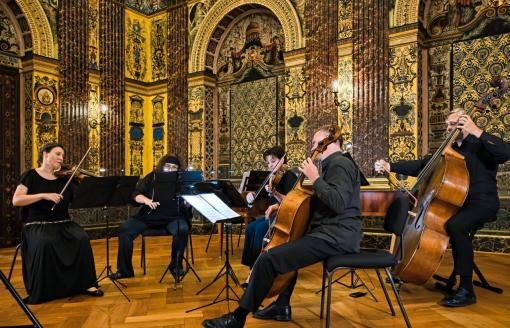At the penultimate concert of its tenth year jubilee staged in the Fresco Room of the Comenium Elementary School, the Olomouc Baroque Festival presented an evening with the Musica Florea ensemble. The musicians, conducted by cellist Marek Štryncl, performed a selection of compositions by forgotten classical and early romantic composers Karl Kohaut, Jan Ladislav Dusík and Johann Nepomuk Hummel. The choice of composers was not random – this year it is 210 years since Dusík’s death and 185 years since Hummel’s death. Performing with the ensemble’s core members – violinist Magdalena Malá and Simona Tydlitátová, violist Lýdie Cillerová, cellist Marek Štryncl and bass player Ondřej Štajnochra – was Petra Matějová on the fortepiano.
The evening began with the three movements of Sinfonia à 4 in D by Austrian composer of Czech descent Karl Kohaut (1726–1784). The opening movement Allegro molto already demonstrated something about the composition qualities of the so-called “last Viennese lutenist”. Although Kohaut’s music really sizzled with sparks and optimism, it never slid into musical exhibitionism or banality. Instead, in many places it confirmed that the composer was able to create very listener friendly music, without having to sacrifice its aesthetic qualities. If you include an almost Mozart-like lightness, this was undoubtedly an excellent start to the programme. However, Musica Florea went even further, and apart from the Sinfonia in D it also performed two of his Sinfonia in G – one in the middle (à 3) and the second (à 4) at the end of the entire programme. So the work of Karl Kohaut formed the basic architecture of the evening which, in view of the abovementioned qualities that applied to all three compositions, was an example of immensely well executed dramaturgy.
Nevertheless, Kohaut’s level of composition would not have excelled even by a half if it had not been for the performances of the artists. The instrumentalists of the Musica Florea ensemble gave a powerful performance which was underlined by the carefree and joyful melody of Kohaut’s symphonies. Not even the gentleness of the Andante from the Sinfonia à 4 in D or the dance-like Presto from the Sinfonia à 3 in G escaped the musicians and they supported it with direct effort involving expression and tempo.
Besides the works of Karl Kohaut, the other dramaturgical attraction was the works with the fortepiano part: Quintet for the fortepiano and strings in F minor, op. 41 by Jan Ladislav Dusík and the Quintet for the fortepiano and strings in E-flat minor, op. 87 by Johann Nepomuk Hummel. It was in these works that pianist Petra Matějová joined the ensemble. The first to be heard was the quintet by the native of Čáslav, Jan Ladislav Dusík, of 1799. The composition contains a number of virtuoso elements, rapid runs and figurations and places considerable demands on instrumentalists – not just on the piano part. Matějová mastered all the instrumental challenges which appear in Dusík’s composition (who incidentally was known for being a virtuoso pianist). The other instrumentalists also had no problem with the part, however the actual interplay was not always totally convincing and a hundred percent. The second composition, which required the participation of the pianist, was the quintet by Johann Nepomuk Hummel, which in my opinion was the true highlight of the evening. This was a unique composition full of fresh melodic ideas and bold harmonic sequences, but the musicians also achieved brilliant interplay.
Perhaps any one of the visitors could have objected to the fact that I do not mention occasional intonation problems which appeared in the performance of the musicians as the evening progressed. However, the musicians cannot be blamed for something that was out of their hands: the absurd heat and humidity that pervaded the room did not provide any other option for the instruments. On the contrary, the musicians deserved great credit that given the conditions they still managed to put in such a performance. The question is why were the windows in the room mostly kept closed? Although there was a slight drizzle outside to begin with, there would not have been any danger of rain coming in through the open windows and falling on the cameras and other equipment. There were similar conditions at the previous festival concert when the musicians finally opened the windows themselves. This is not just about the comfort of the musicians who had drops of sweat on their foreheads and slippery bows, but also the condition of the instruments which such an unsuitable environment brings on…
The concert of the Musica Florea ensemble and Petra Matějová presented brilliant dramaturgy and executed artistic performances. This was also an appropriate finale to the festival. The last concert of this year’s Olomouc Baroque Festival was the evening of the Mecca of Young Organists, which presented the 7th year of the artistic classes of the Mecca of Organists held by Jaroslav Tůma.
Karl Kohaut (1726–1784): Sinfonia à 4 in D (Ap 11)
Jan Ladislav Dusík (1760–1812): Quintet for the fortepiano and strings in F minor, op. 41
Karl Kohaut (1726–1784): Sinfonia à 3 in G (KK 29)
Johann Nepomuk Hummel (1778–1837): Quintet for the fortepiano and strings in E-flat minor, op. 87
Karl Kohaut (1726–1784): Sinfonia à 4 in G (Ap 14)
Petra Matějová – fortepiano
1st violin: Magdalena Malá
2nd violin: Simona Tydlitátová
viola: Lýdie Cillerová
cello: Marek Štryncl
bass: Ondřej Štajnochr
Fresco Room of the Comenium Elementary School, Olomouc
27 August 2022, 7:30 pm
































No comment added yet..